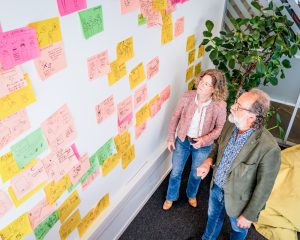Collaborative capital: the value of soft skills in technical domains
“In multidisciplinary projects, people are often experts in their own fields and basically speak different languages,” explains TU/e researcher Piet van Gool. “Most of the time, innovation goes wrong because of the human factor.”
With a background in both psychology and industrial engineering, Piet has found his perfect match in the Eindhoven Engine project Building Collaborative Capital with Tailored Developmental Journeys. This recognizes that limited focus has been placed on soft skills for effective collaboration across disciplines and institutions, which is an absolute necessity for innovation acceleration through co-location. The project will therefore develop, implement and test a set of modular and scalable instruments and interventions for assessing and developing collaborative competences.
Benefits versus burdens
The genesis for this occurred when Piet’s colleague Josette Gevers met Maarten Steinbuch to discuss soft skills within the Engine. “Most people don’t know that there are actually psychology groups in Eindhoven, but we’re in the Human Performance Management group of Industrial Engineering. At a technical university, it’s quite rare!” says Piet. “That’s also where I did my PhD, which looked at job crafting: making little changes to your job on your own initiative to become more engaged and creative in your work. I particularly looked at how people construct and use their social networks, so basically how they collaborate. It’s not so much about the technical stuff but the interactions between people and how they work.”
‘One of my goals is to give people the practical skills to create their own ideal environment.’
In terms of working methods, one complicating factor in projects can often be the combination of different institutions with different incentives. Eindhoven Engine, for example, has many PhD students who are interested in collaboration but are simply too absorbed in their own discipline. Articles must be published quickly and efficiently and shared goals may be missing, so collaboration can seem like more of a burden than a benefit.
The power of tacit knowledge
To counter this perception, the project is currently co-constructing and validating collaborative strengths-based capability profiles. “In order to unlock the collective intelligence of Eindhoven Engine, we need to assess these in our population and try to build or source interventions to improve the skills and competences of team members,” continues Piet. “Ideally, I would do this not only via questionnaires but also simulations, social network analysis and sociometric badges. I definitely want more face-to-face meetings, including with the Eindhoven Engine community. Most of the things you learn are from your peers – tacit knowledge that you can’t read anywhere. You meet in the corridor or at the coffee machine; you’re not going to have a Zoom meeting about how science works!”
Ultimately, the project should result in a toolbox of validated instruments and interventions for building collaborative capital, which can then easily be implemented on a larger scale. “One of my goals is to give people the practical skills to create their own ideal environment and make the best use of their own strengths and those of others,” Piet concludes. “If you have such an environment, innovations will come.”

